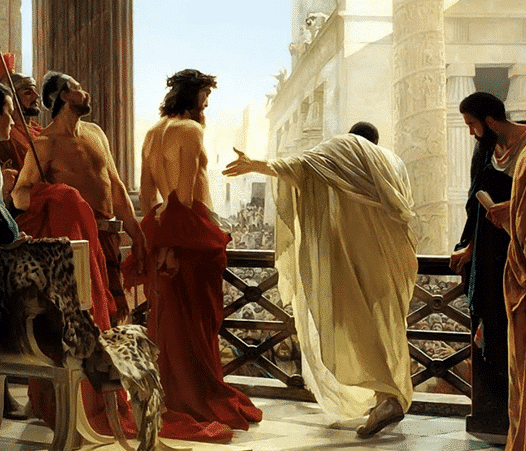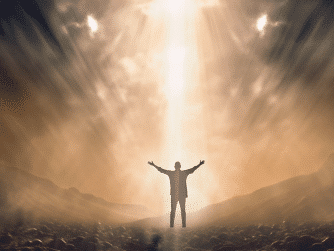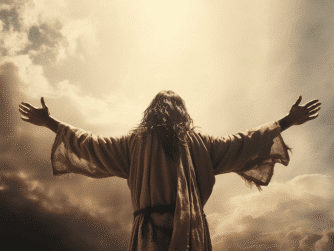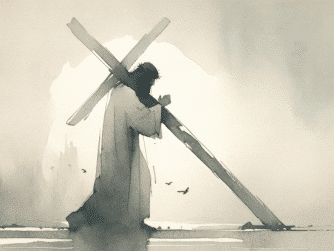Jesus on Trial – Does creation have the right to judge its creator? The trial and travesty of Jesus Christ occurred two thousand years ago in Jerusalem, under Roman supervision. It was the pivotal moment in history and has far reaching repercussions, even to this day. In this insightful broadcast, Carl describes how the judicial court, reached its verdict behind closed doors, in the dead of night. What charge did the Sanhedrin seek to indict Christ with? What supernatural forces guided the Roman guard, Pharisees and Herodians to sentence an innocent man to death, for crimes He never committed? Join Carl now…
Here is a complete transcript of the broadcast (below)…
The trial of Jesus Christ was the greatest disaster of the human race. Think about it. The Creator was crucified by the creation. His own creation rejected Him for all to see.
The author of the covenant, the Mosaic law, the sacrifices, the one who had appointed the Levitical priesthood, and the great day of atonement was in their midst, and they did not recognize Him. The trial, with its bitter jealousy, its deception, its dishonesty, where the God of the old covenant was spit upon, reviled, and cast out by the very people He brought into being. Friend, this is the trial of Jesus Christ.
So, when it comes to the trial itself, there’s a comparison of two trials on the night Jesus was betrayed, one before the Sanhedrin and one before Pontius Pilate. The trials of Jesus are found in all four Gospels, which show a remarkable amount of agreement in their descriptions. The seeds of the arrest and trial had been sown earlier, of course, in the Gospels.
Early in Mark’s Gospel, there was an active resentment which was growing against Jesus, until two members of Jewish groups, namely the Pharisees and Herodians, plot to destroy Jesus. John’s account depicts Jesus’ enemies confronting Him in order to find a charge to bring against Him, but of course, friend, He was innocent from the outset. All four Gospels recount that after Jesus is arrested, He is brought before the high priest.
Matthew and Mark detail the scribes’ and elders’ presence, while John relates that Annas, father-in-law of the then-current high priest Caiaphas, is present. The main claim or charge they had against Jesus was his threat to destroy the temple. And of course, this would have been Herod’s temple, which was present at the time and later destroyed in 70 AD by the marauding Romans. But of course, when Christ spoke of the temple, He wasn’t speaking of a physical temple. He was speaking of His own flesh. Jesus claimed in Matthew 26:61*, that He would rebuild the temple in three days, speaking of His resurrection (*correction: scripture is John 2:19 NOT Mat 26:61, “Jesus answered and said unto them, Destroy this temple, and in three days I will raise it up.”)
These Pharisees were trying to bait Jesus to commit blasphemy, but He would not. Frustrated by their lack of progress, the high priest asks Jesus if He truly is the Son of God. When Jesus answers in the affirmative that He is God, the Sanhedrin believe that they had their case, sentencing Jesus to death according to the laws of blasphemy. And in doing so, He was charged with a death sentence. Craig Blomberg, who is a theologian and historian, summarizes it this way.
After His arrest, Jesus is brought before the Jewish leaders in three phases. An informal hearing before Annas, a more formal trial before Caiaphas, and the Sanhedrin while it is still dark, and a brief early-morning rubber-stamping of the nighttime verdict made by the same court, perhaps to create an aura of legality. But friend, this was not a legitimate trial, because it failed to correspond to the procedures laid out in the Mishnah, in that the trial was held at night, it was held on the eve of a holy day, in an irregular location with no witnesses for the accused and others.
Friend, this was a kangaroo court, it was a setup from the outset. It is also believed that these murderous Sanhedrin were also responsible for carrying out death sentences against Stephen and James, the brother of Jesus. The Sanhedrin, of course, were a supreme judicial council of Judaism with 71 members located in Jerusalem.
The history of them is hard to construct. It is believed, according to Jewish tradition, that this council came from the tradition of Moses and his council of 70. But this cannot be confirmed. The objective of God was to redeem mankind. Jesus had to go to the cross, friend. He did it willingly, but do not think that he did not suffer greatly. Why? Because he became a curse for us, and he became sin for us. At no other time had a God ever achieved this, but at the trial of Jesus Christ, God sanctioned his end and resurrection through the judicial powers of that day. 2nd Corinthians 5:21, “Him who knew no sin, he, God the Father, made to be sin on our behalf, that we might become the righteousness of God in him.”
Right standing, friend, is the reason that Christ came, that we may attain right standing, the same right standing that Adam and Eve had before they fell in the Garden of Eden. But friend, we have to understand why there was such a supernatural hatred for Christ during his ministry. He had presented to them God Jehovah in physical form. He was born of his Father’s seed. That would be Jehovah God’s seed. In many of the modern translations, it says that Joseph was the Father of Jesus.
This is blasphemy. This is true blasphemy. No, friend, the King James makes it clear that the Father is the Heavenly Father who impregnated by his spirit Mary, who then gave birth to a son who did not have the Adamic nature within him. Christ had a perfect body of perfect flesh, and he demonstrated the love of God in action by healing the sick and teaching all who needed to hear the truth. But friend, Satan’s nature was in the Sanhedrin. Satan’s nature was in Pontius Pilate.
Satan’s nature was in the Roman guards. There was a hatred for him. They wanted to destroy him. Satan had made many attempts on his life prior to this, but until the time that was set for him to die on the cross and to pay the wage of our sin, until that time, he would not be allowed to die. God had thrust himself upon the Jewish nation, and especially the high priesthood. They did not realize that the God to whom they had been offering sacrifices was among them.
He had come into their midst incognito. He had come in the flesh. He had revealed himself through his miracles and his love for humanity, yet they still rejected him. Jehovah God fulfilled the old covenant made with Abraham, and he appeared in physical form. He was the manifestation of that very covenant. Not once did Jesus reveal that he was the one who delivered their fathers out of Egypt, but anybody who had read their Bible, friend, would have known that the man in their midst were the many prophecies that had gone prior was the very Son of God.
You have to recall, friend, that Pontius Pilate was very reluctant to crucify Jesus. His wife had had a dream about the event prior. Pilate refused to be responsible for the blood of Jesus and washed his hands of the whole thing, but friend, it was these Pharisees and the Sanhedrin who were literally fulfilling the words Jesus spoke in a parable earlier.
If you recall in Luke chapter 20, verses 9 through 19, it tells the story of a man who planted a vineyard and rented it out to a husbandman before going to another country for a long time. Eventually, he sent a servant to visit the vineyard and receive fruit from it, but the servant was beaten and sent away empty-handed. This occurred three times before the man decided to send his own son in the hope that he would retrieve reverence from him.
But the wicked husbandman schemed to kill him that the inheritance might be theirs. Friend, they had stoned the prophets in times gone by, and yet Jesus was in their midst, Jehovah God in manifest form, and they were willing to kill the son of the vineyard owner. John chapter 1, verse 14 says, the word became flesh and dwelt among us, and we beheld his glory, glory as of the only begotten from the Father, full of grace and truth.
The realization, friend, that Christ would suffer greatly came in the Garden of Gethsemane, and in fact, you can read more about the sufferings of Christ on our website in an article entitled, The Blood of Jesus, Mysterious and Majestic. In this article, I take the time to describe the justification by his blood, the fourfold purpose of Christ’s blood, being the redemption, cleansing, justification, and reconciliation of us by his blood. I also go into detail of the five fold evidences of Christ’s blood being shed.
Friend, I would urge you to check out that article if you have more time, because it will go into more detail concerning Christ’s literal suffering. But I believe he suffered more in the Garden of Gethsemane than he did on the cross, because he realized he was going to become sin, he was going to become a curse. He had never experienced this before. He was facing hell. He was facing hell in our stead. He felt the agony of hell. In the garden, he knew what was before him, and that is why, friend, he sweat droplets of blood. Jesus knew that the moment had come when he would be sin. He would partake of that dread nature of the adversary.
His body would become mortal. Satan would become his master for a short period of time. This was the tragedy in the garden. Jesus was to suffer the agonies of the lost that they feel right now in hell. And most of all, he was to be forsaken by his father, which is why he cried out on the cross, Father, Father, why have you forsaken me? It was the separation that he felt, being apart from God, because God could not look upon his sin that he had become. This was the ultimate feeling of rejection. So, Satan ruled over the Sanhedrin, the Senate, the Roman governors. It speaks of the satanic assault against Christ and the agenda that the dark demonic forces had in killing our Lord Jesus. It speaks of this in 1 Corinthians 2:6-8.
They would not have crucified the Lord of glory. Yes, Christ willingly laid down his life, but those who performed the murder were the ‘archons’ or princes of this world. That word for prince is ‘archon.’ The term ‘archon’ means high official or chief magistrate typically, and it became known as the word for a variety of high public officials. But, friend, there’s an allusion here to the spirit realm. The principalities, powers, and rulers of darkness were the ones who manipulated the Roman gods, manipulated the Sanhedrin, manipulated Pilate to kill Christ.
They had a demonic hatred for him. In early Judaism and early Christianity, the term archon was one of the designations used to refer to the evil spiritual rulers of human beings and the cosmos, known by a variety of aliases, including Satan, the Devil, Belial, or Mastemah. The Synoptic Gospels occasionally refer to Satan as the archon ton daimonion, prince of demons, referenced in Matthew 9:34, Mark 3:22, and Luke 11:15. It is because the demons were thought to be organized like an army or a political hierarchy.
The irony, friend, is that these archons were destroyed in the very act of the crucifixion. They were destroying themselves by attempting to destroy Christ. It is in hell that Christ brought these principalities and powers to nothing. And we now sit in heavenly places in Christ Jesus, far above principality and power because of what Jesus did. Amen. The trial of Jesus Christ, friend, impacts you. It impacts me. It impacts the entire human race. It is the death now, the death sentence for Satan.
It began the court proceedings in the heavenly realms which ended his dominion in the earth. And finally, we will live it out in the millennial reign as we join Christ to rule and reign with him. You see, friend, God knew that humanity would fall. He would choose the way of Baal. He would choose Satan’s way. He was beguiled. But God, in his love and his mercy, had a means of escape, and that is believing on the Lord Jesus Christ. Friend, have you made that choice? I urge you today. Time is running out.
Bibliography:
D. E. Aune, “Archon,” ed. Karel van der Toorn, Bob Becking, and Pieter W. van der Horst, Dictionary of Deities and Demons in the Bible (Leiden; Boston; Köln; Grand Rapids, MI; Cambridge: Brill; Eerdmans, 1999), 83.
William M. Victor, “Jesus, Trial of,” ed. John D. Barry et al., The Lexham Bible Dictionary (Bellingham, WA: Lexham Press, 2016).
What happened from the cross to the throne – E. W. Kenyon (Whitaker House, New Kensington, PA, 2010).
https://carljosephministries.com/the-blood-of-jesus-mysterious-and-majestic/
https://www.gotquestions.org/blood-of-Christ.html
Title: Jesus on Trial
Related keyword searches:








